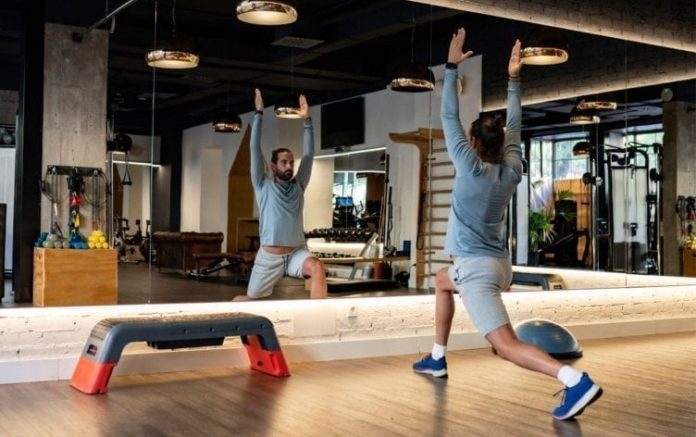
Even the most dedicated athletes can struggle to fit in a scheduled daily workout. While your initial inclination might be to skip a day and do your best to get back on track tomorrow, the truth is, there are alternative options to explore to still get in that quality workout.
From hopping on the bike at the gym to dance workouts and run/walk circuit training, we asked four coaches across various disciplines for their favorite workouts that can happen in 30 minutes or less.
1
THE RUN/WALK CIRCUIT
Jeff Gaudette, head coach of Runner’s Connect: “My favorite 30-minute workout is a run or walk with a strength circuit. This workout combines both aerobic and strength work in a short period of time, which gives you the best of both worlds.
“This type of workout is especially helpful for beginner runners, walkers, or injury-prone athletes who need to get in strength work but often skip it due to time constraints. Not only will this routine provide you with a dynamic way to gain aerobic fitness, it will strengthen your running muscles so you can increase your volume with less injury risk.”
How to avoid injury: “The one thing to be cautious about with this type of workout is maintaining proper form with strength work, especially the last two rounds. As you get tired, it’s easy to let your form deteriorate, which could lead to injury. Make sure to use proper form, and don’t hesitate to take a short rest or lessen the repetitions if needed.”
The workout: Start with a run or walk of 3–5 minutes, then complete a short round of 3–4 dynamic strength exercises. Do this for 4 rounds, then cool down.
2
THE COMPLEX (HIIT)
Kickoff head coach Sarah Venturini, an ACE-certified trainer and NSCA strength and conditioning specialist, says, “My personal favorite style of short-on-time, high-intensity workout is ‘The Complex.’ Complexes involve sequential exercises that are performed consecutively back-to-back with no rest between each exercise. You can do complexes that use bodyweight-only, dumbbells or barbells, but if you use weights, ideally, you should aim to use the same weight the entire way through and make sure you don’t put your equipment down until the entire sequence is completed.
“This workout targets strengthening large and small muscle groups while using multi-joint, compound movements. It also targets fat-loss because these shorter bursts of higher intensity helps you burn more calories while at rest throughout the remainder of the day (in a way that long-duration cardio does not, for example).”
How to avoid injury: “You’ll want to be careful to choose the right amount of weight. The weight chosen should allow you to feel like you can do all exercises with great form each rep, but also be challenging and give you a good push. This isn’t a ‘max out’ type of workout where you want to choose the heaviest weight possible as we’re moving swiftly between exercises (and injury prevention/safety is always the priority). For each exercise, if you feel like you could do a couple of extra additional reps at the end of each set, you’ve hit the ‘sweet spot.’ Be sure to take the full amount of rest and hydrate well between each round to allow adequate recovery so you can crush it again on the next round.”
The workout:
- Start with a dynamic warmup that includes movement preparation and mobility to prevent injury and increase performance.
- Complete this circuit for 4–5 rounds, resting for 60 seconds between rounds (perform each of the following exercises 5 times before moving onto the next):
- dumbbell renegade row to up down
- dumbbell front squat
- dumbbell push press
- dumbbell lateral squat to bicep curl (each side)
- one-arm dumbbell snatch (each side)
- dumbbell reverse lunges (you can substitute jumping lunges)
- Finish with a 5-minute cooldown.
3
THE SWEET SPOT CYCLING SESSION
Founder and head coach of Thomas Endurance Coaching Taylor Thomas: “In cycling terms, the ‘sweet spot’ is 88–94% of your functional threshold power (FTP), or the maximum effort you can sustain for an hour of cycling. This is effective because it allows for the optimal balance of intensity and volume, enabling you to achieve increased aerobic development without the fatigue of more difficult sessions.”
How to avoid injury: “A proper warmup and cooldown are recommended even when you’re pressed for time. The goal should be to increase the frequency of these workouts and the duration of the sweet spot interval over time to elicit improvements in aerobic and muscular development.”
The workout (can be done on an exercise bike at the gym or an indoor cycling trainer):
- Warm up for 5–10 minutes.
- Main set:
- 8 minutes at 88–94% of FTP (if you’re using a power meter), or just shy of the effort you can maintain for 1 hour of cycling — challenging, but not all out. If you’re using heart rate, this will likely put you into Zone 4.
- Recover for 4 minutes with easy spinning, decreasing the intensity by about half.
- Repeat this cycle.
- Cool down for 5 minutes.
4
PLYOJAM DANCE WORKOUT
Jason Layden, creator and co-founder of PlyoJam: “It’s important to find a workout that is fun and effective. Those two things encourage me to find the time it takes to do a 30-minute workout. The PlyoJam dance workout includes plyometric movements, which are strategically placed throughout the choreography to offer an interval training type of workout. The workout challenges your speed, agility and your reaction time, firing your calves, quadriceps, hamstrings, glutes and core. The combination of the dynamic dance movements paired with the power and energy needed to perform the inspired plyometric movements offer a good balance of athleticism and fun!”
How to Avoid Injury: Take it slow and build up to these kinds of efforts if you don’t have experience with plyometrics or dance workouts. If you aren’t ready for 30 minutes, there are 15-minute options available, too.
Check out “Workout Routines” in the MyFitnessPal app to discover and log workouts or build your own with exercises that fit your goals.









